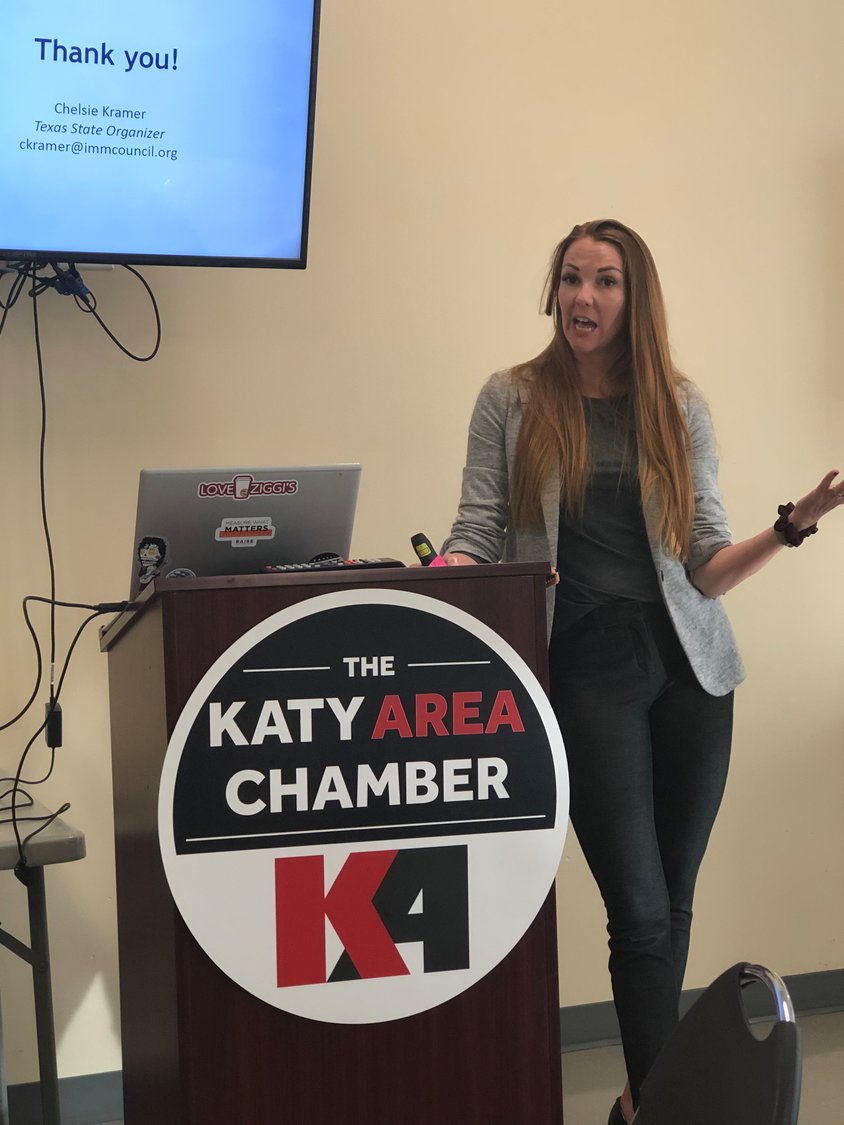Immigrants bring economic growth to Katy area, expert says
People often have a misperception that immigrants to the United States must get into a line to have a chance to legally become a citizen. However, the system does not work that way, an immigration expert said.
This item is available in full to subscribers.
Attention subscribers
To continue reading, you will need to either log in to your subscriber account, below, or purchase a new subscription.
Please log in to continue |
Immigrants bring economic growth to Katy area, expert says
People often have a misperception that immigrants to the United States must get into a line to have a chance to legally become a citizen. However, the system does not work that way, an immigration expert said.
Chelsie Kramer is a state organizer with the American Immigration Council, a nonpartisan group that works to educate people about immigration issues and working to improve the system. She spoke Thursday at the Katy Area Chamber of Commerce meeting at the YMCA, 1350 Main St.
As for the misperception, Kramer said there are times after explaining that the immigration system is based on a lottery, and not on a line, people will argue with her. She said people can spread the misperception, and it is often cited by political figures in interviews.
Kramer said Mexico is the leading country of origin for immigrants in the Katy region, accounting for 22.7% of the 275,800 immigrants who lived in the region in 2019. At 7.7%, Vietnam is the second-place country of origin for immigrants to the Katy area.
The growth in the number of immigrants to the Katy area comes as the Katy area itself accommodates strong overall growth. The overall population grew from 857,802 to 999,600, or 16.5%, between 2014-19.
Kramer cited statistics that said immigrants to Katy also support federal social programs. They contributed $1 billion to Social Security and $287.4 million to Medicare in 2019. The amount earned by immigrant households and 2019 was $10.6 billion, which of which $2 billion went towards federal taxes and $805.6 million went to state and local taxes.
Despite these figures, Kramer said she thought there is a big misperception that immigrants take more than they give to social programs. But across the state, she said, this is not true.
“They take less from social programs than native-born Americans do,” Kramer said, adding that despite making up 27.6% of the overall regional population, immigrants made up 45.6% of the entrepreneurs in 2019.
Kramer said immigrant entrepreneurs play an important role in various industries, including Gen. services, construction, professional services, transportation and warehousing and retail trade. Of these, the top three are general services (19.4%), construction (18.7%) and professional services (16%).
After taxes, immigrant households had approximately $7.7 billion in spending power. Kramer said this figure represents 32% of all spending power in the region.
“That is a huge number for this region,” Kramer said, adding that she expects that figure to grow as the area grows.
Much of that money is going into houses. Kramer said in 2019, 64.3% of immigrant households in Katy on their homes. Meanwhile, she said, 35.7% of immigrant householders were renters.
As for naturalization, Kramer said 128,300 immigrants in the Katy area, or 45.6%, were naturalized US citizens. Meanwhile, 19,300 immigrants, or 7%, were likely refugees in 2019.
Kramer said an estimated 78,600 people, or 28.5% of the immigrant population, were undocumented immigrants. Leading industries for these people include construction (16.4%), professional services (12.9%), retail trade (12.6%) and hospitality (also at 12.6%).
The top country of origin for undocumented immigrants in the Katy area is Mexico (34.2%), with El Salvador in second place with 8.7%.
Kramer said immigration reform efforts often get stuck because the issue is a moneymaker for both the major political parties.
“It is a topic that they are able to fundraise on,” Kramer said. “Unfortunately, that is the reality we are in.”
Kramer said the issue encourages anti-immigration primary voters to go to the polls, but pro-immigration primary voters are less likely to go to the polls solely on that issue. Pro-immigration voters, she said, tend to vote on a lot of issues.
Keywords
Katy Area Chamber of Commerce, immigration






